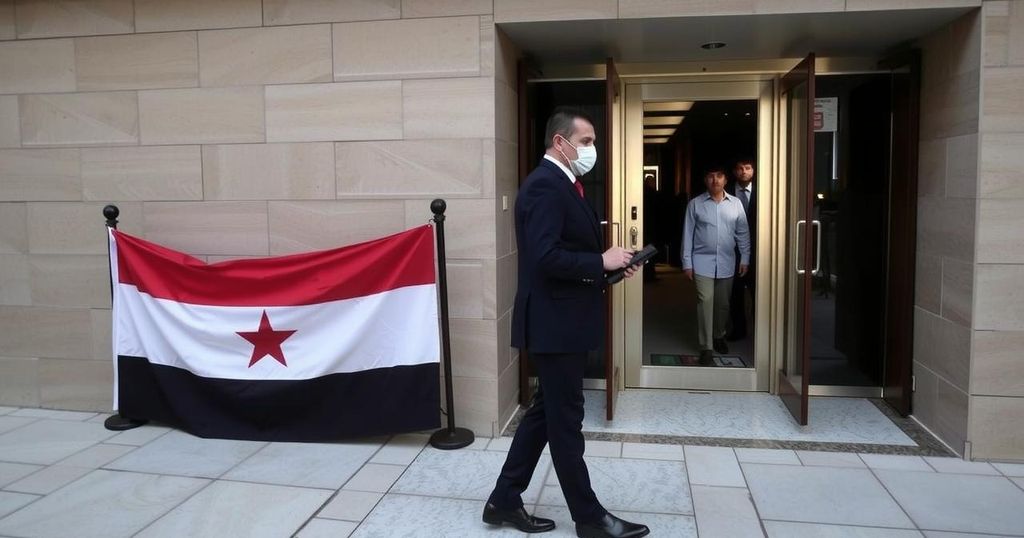Syria’s embassy in Lebanon has suspended services amid political unrest, following the arrest of relatives of deposed President Bashar Assad. This action coincides with the handover of Syrian nationals, including former army officers, to new authorities in Syria, led by Hayat Tahrir al-Sham. The situation reflects broader tensions and shifting power dynamics within the region, raising concerns over human rights and political inclusion, particularly for women.
Syria’s embassy in Lebanon announced the suspension of consular services following the arrest of two relatives of former President Bashar Assad at Beirut airport, where they were caught with alleged forged passports. This decision coincided with the Lebanese government’s handover of several Syrians, including ex-Syrian army officers, to the new ruling authorities in Syria. The embassy’s suspension was ordered by the Syrian foreign ministry and did not specify further reasons. Local reports suggest that the arrest may have involved unauthorized activities relating to the embassy’s operations.
The situation escalated as approximately seventy Syrians were returned to Syria, a move heavily monitored by the Syrian Observatory for Human Rights. These events follow a shift in power dynamics within Syria as the former insurgent group, Hayat Tahrir al-Sham (HTS), has gained control under controversial circumstances. HTS has attempted to mitigate fears of reprisals against Assad’s supporters, undertaking security measures that have included raids against alleged pro-Assad operatives.
Meanwhile, diplomatic relations in the region appear to be normalizing as delegations from other countries, like Libya and Bahrain, arrived for official visits in Damascus. However, the power transition has not been smooth, evidenced by ongoing tensions and regional conflict, particularly concerning Kurdish forces and their relations with Turkey. The U.S. has also engaged diplomatically to promote a respectable political process in Syria, emphasizing the importance of human rights and an inclusive government.
Moreover, significant protests took place in northeastern Syria, advocating for women’s rights under the new regime. Participants expressed concerns over the potential marginalization of women in the new political landscape, emphasizing the necessity of their inclusion in any constitutional developments that may arise. The rise of HTS has prompted apprehension regarding women’s rights and agency within this newly established governance.
“Women must be present in the new constitution for Syria,” stated Rihan Loqo, spokesperson for the Kongra Star women’s organization.
In conclusion, Syria stands at a crucial juncture with its recent shifts in authority, and the ramifications of these changes are widely felt. The suspension of services at the Syrian embassy in Lebanon symbolizes the broader tensions stemming from both domestic unrest and international scrutiny. While the new leadership may emphasize less harsh rule compared to Assad’s regime, significant challenges regarding human rights, governance, and the integration of all societal factions remain unresolved. The outcome of these changes will greatly shape Syria’s future.
The article addresses the current political turbulence in Syria and its impact on consular operations in Lebanon. It highlights the recent developments following the arrest of relatives of Bashar Assad due to alleged passport forgery and the ongoing handover of Syrian nationals to new authorities in Syria. The context includes the rise of Hayat Tahrir al-Sham, which has reshaped power dynamics within the region and has implications for various groups, including women and ethnic minorities. It also discusses international relations and the responses from other countries regarding the evolving situation.
In summary, the suspension of consular services at Syria’s embassy in Lebanon illustrates the intricacies of the current geopolitical climate influenced by the arrest of Assad’s relatives and subsequent actions by Lebanese authorities. The emergence of HTS and the resulting regional engagements signify a shift in power dynamics, coupled with the need for inclusivity and rights advocacy in Syria’s political reconstruction. As protests highlight the demand for women’s rights, the future governance model remains a critical focal point for both domestic stability and international relations.
Original Source: www.independent.co.uk






